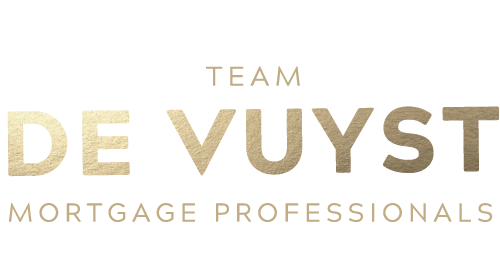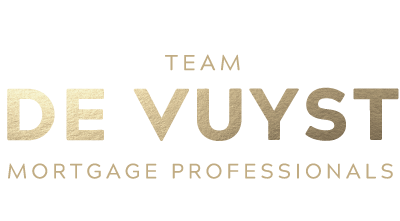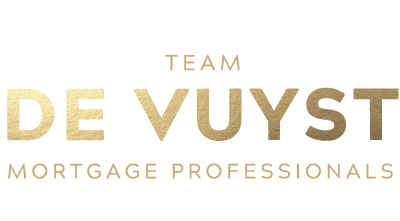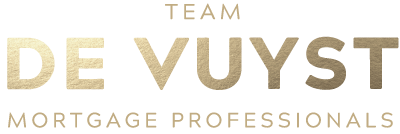WELCOME TO TEAM DE VUYST
What sets us apart from others in the industry is the dedicated team that we have handling every aspect of your mortgage. After our initial consultation we will start the mortgage process by gathering your information and assembling a package based on our mortgage plan.
Our dedicated Underwriter will work with a wide range of lenders suited to your needs and handle all correspondence between yourself and the lender. This separates us as you have the utmost responsiveness and first-class service throughout the mortgage process.
Throughout the course of your mortgage term we stand dedicated and ready to assist with any questions, concerns, or changes you need applied to your mortgage. We’re only a phone call away!






OUR PROCESS
START THE CONVERSATION
The best place to start is to connect with us directly. The mortgage process is personal, and it can be daunting. Our commitment to you is that we'll listen to all your needs, assess your financial situation, and provide you with a plan to move forward.
CHOOSE THE BEST OPTION
Once we’ve had a look at your financial situation, we’ll consider a variety of mortgage options, we'll outline what documents are necessary to qualify for a mortgage, negotiate with the lenders on your behalf, and arrange the mortgage that best suits your needs.
SIT BACK AND REST EASY
Once we’ve arranged the mortgage product that best suits your needs, you’re not alone. We're your mortgage professionals for life. If you’ve got questions in the years to come, we're always available to make sure that your mortgage is working for you, and not the other way around!
SERVICES
HOME PURCHASE
The largest investment in your life needs the utmost care and attention, that’s where we come in! From purchase to completion our dedicated team will handle every aspect, so you can breathe easy and feel confident with your new home purchase.
RENEWAL
At Team De Vuyst we handle this for you prior to your term coming due. With our systems in place we will notify you months ahead to get in touch and go over your new mortgage plan. We will handle booking rates and completing your new mortgage well ahead of your renewal date.
EXPANSION
With your real estate investment typically growing every year we at Team De Vuyst have an in-depth knowledge of how to use that value to obtain a growing real estate portfolio. We work with clients to grow their dreams and retirement in ways they never thought possible!
JAMES DE VUYST
YOUR PRIVATE MORTGAGE BROKER
PROVIDING AWARD-WINNING SERVICE AND TAKING CARE OF ALL YOUR HOME NEEDS IN ONE PLACE, ASK ME FOR MORE DETAILS!
James commenced his career as a mortgage broker in 2010, following the completion of his Bachelor of Commerce degree with a dual major in Finance and Marketing. During his tenure, he collaborated with a highly esteemed broker before transitioning to the Verico network in 2014. Within a relatively short period, he garnered recognition within the industry as a rising star.
Subsequently, in 2019, James established Team De Vuyst Mortgage Professionals through Verico Paragon Mortgage, recognizing his desire to offer a comprehensive service beyond the current offerings in the mortgage industry.
The foundation of Team De Vuyst is to provide a private banking-like experience, ensuring clients receive comprehensive information on all aspects of the mortgage process, including economic trends, market fluctuations, and local regulations that may impact their future purchases and mortgages.
James’s primary focus is on long-term strategic planning, whether for building a rental portfolio, acquiring one’s first home, or implementing more intricate investment strategies. His extensive knowledge and industry experience position him as a leading expert in the field.
In response to these evolving circumstances, James remains steadfast in his commitment to his clients and strives to maintain the private banking atmosphere through his expertise and industry experience. As we navigate these uncertain times, entrusting your portfolio to a professional team is the most prudent decision you can make.
James has also received numerous prestigious awards and accolades.
- Top 5 Producer 2019-2025 Verico Paragon
- 2020 - 2025 Chairpersons Club
- 2020 CMP Industry Icon
- 2019 Canadian Mortgage Professionals Top 75 Funded Volume
- 2019 Top 5 Producer Verico Paragon Mortgage
- 2019 Nominee Young Gun of the Year (top 10 brokers in Canada under 35)
- 2017- 2019 Chairman’s Club Award Verico (top producer in the Verico network)
- 2016/2018 Young Gun Canadian Mortgage Professionals (top brokers in Canada under 35)
- 2016 - 2018 Top Producer Xeva Mortgage
- 2016 Business Excellence Award for Verico (3rd largest network in Canada)
MORTGAGE NEWS








